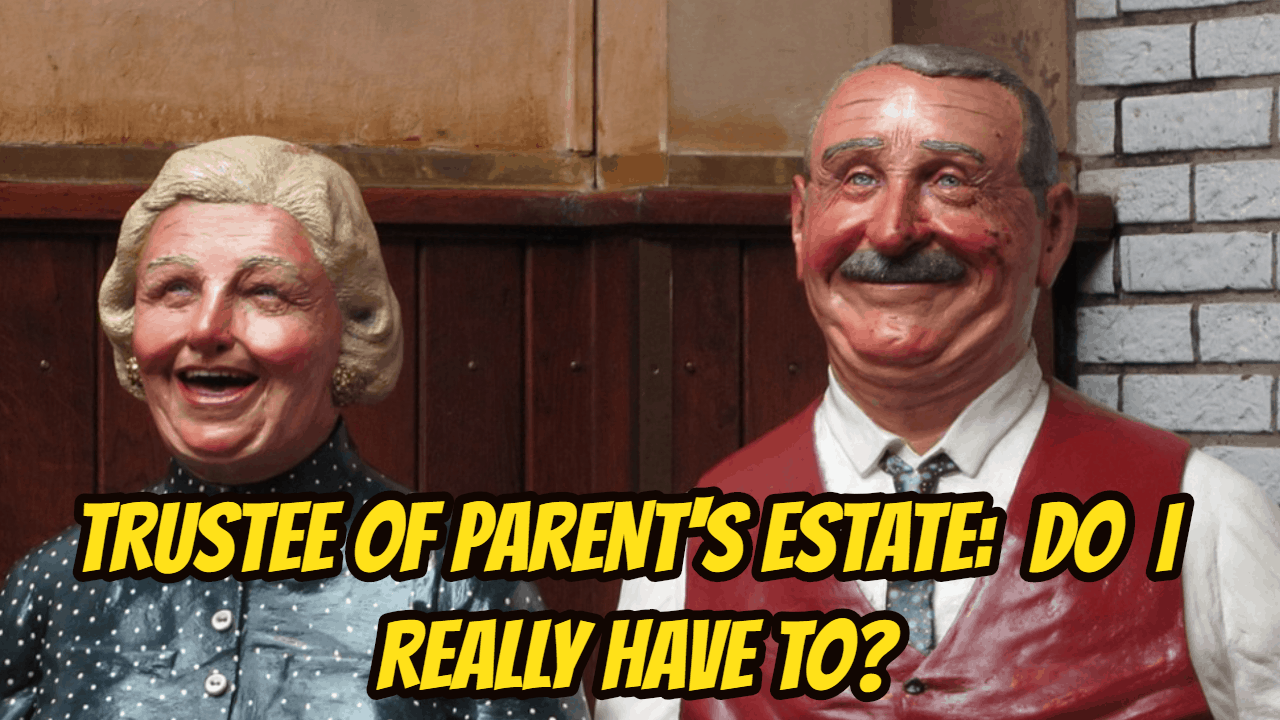If  If you would prefer to listen to the audio version of this Trustee of parents estate
If you would prefer to listen to the audio version of this Trustee of parents estate
Brandon’s Blog, please scroll to the bottom for the podcast.
Trustee of parents estate: Introduction
I want to talk about an issue which is all too common. I am also going to give you two real-life examples. The issue is that of children being named as the estate trustee of parents estate.
I caution that I and my firm are not lawyers, and I am by no means providing in this and upcoming Brandon’s Blogs advice on wills or estate planning matters. For that, you must consult your lawyer.
Why the children?
Many times in drafting a will, parents want their children to know that the parents trust and love them. So, they not only have their children as beneficiaries of their estate, they also make them the estate trustees (formerly known as executor or executrix). This is natural, but may not be the best choice.
The reason I say this is because the role of the estate trustee is a demanding one that requires a specific skill set. Children don’t always have the necessary skills. What if one or more of the children have great financial skills and have sound judgment, but others don’t. This can lead to differences of opinion and major arguments. In the most extreme case, it can lead to costly and lengthy litigation to dissipate estate assets. Executors must act in the best interests of all beneficiaries. If personal agendas get in the way, then everyone’s best interests can’t be met.
Adult children are probably married. Now you have daughters-in-law and sons-in-law involved in the background. This can lead to a whole host of issues that has nothing to do with the efficient administration of the parents’ estate and being even-handed with all beneficiaries.
What if some of the children have personal financial issues. There will be a temptation for self-dealing or self-enrichment. Again this can lead to major problems.
What if you have an even number of children? Two or four estate trustees can lead to many problems. With two, the estate trustees will always be deadlocked if they don’t see eye to eye. With four, not only can you have a deadlock, but too many cooks may spoil the broth!
Splitting the tasks
Sometimes parents split the tasks. One child will be the estate trustee because she has great financial acumen. The other child will be made responsible for health and living decisions if the parents first become incapacitated. Sounds great in theory. However, the way the health decider child wishes the parents to live may be at odds with the financial person seeing the estate shrinking away. Or, the health decider may make decisions for the parents to live in a way that does not shrink away from the estate, but is demeaning to the parents and does not give them a good quality of life in their final days.
So, as you can see, what started out as the parents wanting to “do right” by their children, can lead to many problems.
What an estate trustee should not do
In my last blog, TRUSTEE OF DECEASED ESTATE: WHAT A TORONTO BANKRUPTCY TRUSTEE KNOWS, I spoke about some basic elements of the role of an estate trustee. I described the process of becoming an estate trustee, and what the responsibilities are.
Now, I want to touch on some practical matters of what an estate trustee should not do.
The first is communicating with some beneficiaries and not others. As I have previously described, one of the roles and responsibilities of an estate trustee is to deal with all beneficiaries even-handedly. The estate trustee cannot tell certain details to some beneficiaries, and not others. So, all communications should be with all beneficiaries at the same time; either in writing or orally. Everyone should get the same information at the same time. The estate trustee does not wish to be accused of favouring some beneficiaries over others.
The second thing not to do is to rush to distribute smaller personal possessions of the deceased. The estate trustee may be pressured by family members to distribute certain items quickly. Possibly because the family member is the proper beneficiary of those small items and wants them as quickly as possible. Alternatively, perhaps they are not the rightful beneficiary of all the items they are claiming. However, they want to get their hands on certain items to stop other family members from getting them. Or perhaps there is a home involved that must be sold, so family members will pressure the estate trustee to clean out the home immediately so that the home can be put up for sale as soon as possible.
As tempting and easy as it might be, the estate trustee must first take steps to:
- get a copy of the will and the deceased’s financial records
- take possession and control of all assets
- ensure that a proper inventory is made and that appraisals are obtained where necessary
- make sure that all required insurance and bonding is in place
There is another reason. An estate trustee will be putting more pressure on themselves than they should bY making piecemeal distributions. Regardless of value, making a quick distribution to one of the beneficiaries will only give rise to all the other beneficiaries clamouring for their entitlements. The estate trustee may not be in a position for some time to be able to make a proper distribution to all other beneficiaries. This will only lead to headaches for the estate trustee.
Why some children may not want to be an estate trustee
There can be danger in being an estate trustee. In my last blog, I highlighted specific expertise and knowledge that an estate trustee must have. I also discussed how a licensed insolvency trustee (formerly called a bankruptcy trustee) also possesses the same skill set required of an estate trustee.
A trustee, including an estate trustee, acts in a fiduciary capacity. The estate trustee is fully accountable for all decisions made and steps were taken with respect to the assets. Not only is it important to have the necessary financial skills, but an estate trustee also has to be aware of the myriad of income tax issues. Final income tax returns must be filed. The estate trustee has a duty to ensure that all income tax legislation requirements are met, including the obtaining of clearance certificates. Any loss to the estate as a result of things an estate trustee either did or did not do, the estate trustee will be personally liable for.
The steps required in formulating an appropriate sales process for the different asset types not being directly distributed to beneficiaries is not totally scientific. There is some art to it as well. Making wrong decisions can expose the estate to loss of value, which will blow back right onto the estate trustee.
For these reasons, children may not wish to take on responsibility. The smart ones will understand that they do not have the required skill set. In other cases, the children may see the real possibility of creating family strife if they were to take on the role of an estate trustee. So what if children are named in the will as the estate trustees, but they don’t wish to take on the role. Must they anyway?
Renunciation of estate trustee Ontario
If you have not yet applied for probate or have otherwise not started to administer the estate, you do not have to be an estate trustee. There is a specific form to complete in order to renunciate your position as an estate trustee. Again, it must be done before you take any action as the estate trustee. If you have already applied for probate, or have started administering the estate and now find that you are in over your head, you cannot renunciate your position. You must make application to Court for an Order removing you as the estate trustee. I would suggest that if you are the sole estate trustee, you should have someone else lined up to succeed you. Otherwise, the Court may not allow you to be removed.
Two real-life examples
Example 1
In my blog, COURT APPOINTED ESTATE TRUSTEE CASE STUDY: IF IT WAS EASY YOU WOULDN’T NEED US, I described one of our case studies where we were appointed estate trustee to sell real estate. In that case, neither of the beneficiaries were capable of agreeing on anything. They were also incapable of carrying out the role of taking possession and control of the real property, Insuring it and selling it. Legal counsel for one of the beneficiaries made an application to Court seeking an Order appointing Ira Smith Trustee & Receiver Inc. as an estate trustee.
The Court made the Order. With the approval of the Court, we listed the property for sale, obtained approval to our actions and activities, including a sale of the property. We then proposed a distribution of funds which also was approved by the Court. We made the distribution and obtained our discharge. This is a perfect example of how our skill set as a licensed insolvency trustee was recognized by the Court and allowed us to carry out the mandate in an efficient way.
Example 2
Recently, one of Ira Smith’s cousins needed to update her will and name an estate trustee. This cousin has three children. None of the children believed that they had the necessary skills and knowledge to be an estate trustee. They also agreed that it was not a good idea for any of them to take on that role.
However, there was one thing that the mother and her three children could all agree on. That was that Ira had the necessary skills to be the estate trustee. They unanimously agreed that it would be a good idea for Ira to take on that role. Ira’s cousin asked him if he would. He told his cousin that he was honoured that they all thought so highly of him. He agreed to be named in her will as the estate trustee.
The children were smart. They knew what they didn’t know. They all agreed on the estate trustee being proposed. A huge weight was taken off of the mother’s shoulders.
Trustee of parents estate: Why not appoint a Toronto bankruptcy trustee?
I hope that you can see that the knowledge, experience, and expertise of a licensed insolvency trustee would stand him or her in good stead to act as executor, executrix or estate trustee of a deceased estate. Many times, it may be a smart move to allow an independent neutral third party act as the estate trustee. Especially one like a licensed insolvency trustee who is used to acting as the independent Court officer.
If you have any questions about a deceased estate and the need for an estate trustee, whether it is solvent or insolvent, contact the Ira Smith Team. We have decades and generations of experience in helping people and companies overcome their financial problems. You don’t need to suffer; we can end your pain.
In the meantime, if you have any questions at all, contact the Ira Smith Team.
[monkeytools msnip=”http://monkeyplayr.com/playr.php?u=5173&p=20211″]
[monkeytools msnip=”http://memochimp.com/memo.php?u=4931&p=3676″]


